SUNDAY, AUGUST 9 I review a hundred shows a year, more or less, for The Wall Street Journal. This means that I rarely have time to see anything I’m not reviewing, and that I also have to forgo a not-inconsiderable number of shows, most of them off Broadway, that I’m pretty sure would be worth seeing. This used to trouble me, but I’ve long since learned from hard experience that I don’t profit from theatrical gluttony, so I no longer lose sleep when I make a wrong call. If an off-Broadway show that I’ve chosen to skip ends up making a splash, as was the case with Clybourne Park, The Flick, and Hand to God, I know I’ll get a second chance to review it, usually on Broadway or in a regional revival.
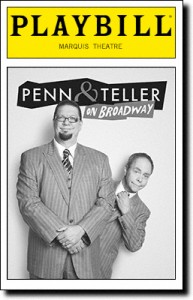 All that said, it was with much reluctance that I passed on Penn & Teller on Broadway in July. I like magic and I love Penn & Teller, but the Journal decided as a matter of policy a number of years ago not to send me to Broadway shows that are “events” rather than full-fledged plays or musicals. In any case, I was already booked to visit the Shaw Festival in Ontario when the show was in previews, so that, I assumed, was that.
All that said, it was with much reluctance that I passed on Penn & Teller on Broadway in July. I like magic and I love Penn & Teller, but the Journal decided as a matter of policy a number of years ago not to send me to Broadway shows that are “events” rather than full-fledged plays or musicals. In any case, I was already booked to visit the Shaw Festival in Ontario when the show was in previews, so that, I assumed, was that.
Toward the end of the run, though, Teller and Mike Jones, the jazz pianist who accompanies Penn & Teller at their live performances, separately invited me to come to Penn & Teller on Broadway purely for my pleasure. By then my calendar was already congested, meaning that in order to see it, I’d have to drive down to New York from Connecticut first thing Sunday morning, catch a matinee, then fly from New York to Portland very early the next day to cover the Oregon Shakespeare Festival. Never having seen Penn & Teller live, though, I felt I shouldn’t pass up the opportunity to do so at last, so I said yes.
No sooner did Mrs. T and I stroll into the Marquis Theatre than I felt an uncanny and unfamiliar sense of something like relief. I was on a busman’s holiday, seeing a show strictly for fun. I wouldn’t have to take notes or worry about hitting a deadline: I could simply surrender to the moment. I think I’m pretty good about being “present” (as theater people say) at the shows I review, but there’s no getting around the distracting fact that I’ll sooner or later have to sit down and write a coherent piece about what I’ve just seen, which means that I have to pay attention in a different, less totally involving kind of way. Yes, it’s a small price to pay for the inestimable privilege of getting to go to the theater as often as I please, but it is a price, and on the rare occasions when I don’t have to pay it, I’m forcibly reminded of the mental freedom that goes with being a civilian who attends performances solely and only because he wants to see them.
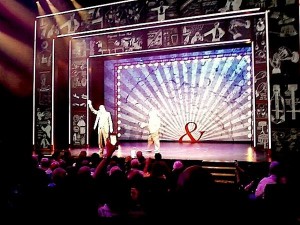 One aspect of that freedom was made manifest midway through the afternoon when Teller pulled me out of the audience to assist him in his celebrated version of Houdini’s East Indian Needle Trick, in which he appears to swallow one hundred embroidery needles and six feet of thread, then pulls the needles out of his mouth—threaded. I didn’t think twice when he walked down the aisle to my seat and gestured for me to accompany him to the stage, as I would have if I’d been reviewing the show. I simply got up and went, and was amazed by what I saw (or, rather, didn’t see) while standing at arm’s length from Teller. For the record, I wasn’t even slightly nervous, just thrilled.
One aspect of that freedom was made manifest midway through the afternoon when Teller pulled me out of the audience to assist him in his celebrated version of Houdini’s East Indian Needle Trick, in which he appears to swallow one hundred embroidery needles and six feet of thread, then pulls the needles out of his mouth—threaded. I didn’t think twice when he walked down the aisle to my seat and gestured for me to accompany him to the stage, as I would have if I’d been reviewing the show. I simply got up and went, and was amazed by what I saw (or, rather, didn’t see) while standing at arm’s length from Teller. For the record, I wasn’t even slightly nervous, just thrilled.
“Well, I just made my Broadway debut!” I said to Mrs. T after returning to my seat, grinning like a kid.
“Do you think he knew it was you?” she asked.
“I wouldn’t be surprised,” I replied.
It happens that Teller has staged three shows without Penn that I’ve reviewed in the Journal, two Shakespeare plays and an off-off-Broadway “spook show” called Play Dead. Since my picture is printed next to my Journal reviews, I took it for granted that he knew what I looked like and decided to amuse himself. But no: Mike Jones assured me afterward that it was pure happenstance that Teller chose me, and that he was astonished to learn that I’d been his obliging stooge.
Needless to say, it was great fun for me to share a stage with Teller, just as it was for me to “perform” with Jefferson Mays and J. Smith-Cameron last year. But it was more fun by far for me to see Penn & Teller do their stuff in front of sixteen hundred wildly enthusiastic fans—though “fun” isn’t quite the right word for it. Never having seen them live, I didn’t realize how oddly, quirkily poetic their act is: I expected to find it amazing, but not poignant. Yet poignant it most certainly is, both when Teller performs his exquisitely wrought solo tricks and when Penn pauses toward the end of the show to chat for a few minutes about fire-eating:
When I was a kid I used to go the Franklin County Fair. That’s where the carnival came in my hometown. And that fair would be in town about ten days every year, and every one of those ten days, I’d go to the fair…I loved the freak show. I loved it because you’d pay your seventy-five cents and you were allowed to go into a tent with people who were entirely different from you, and then you could just stare at them. And I loved the freaks, but I especially loved the self-made freaks, the fire-eater, the sword-swallower, the tattooed people, because they had made an extra decision to be there. I can remember standing in that tent watching the fire-eater, and I swear, my whole life was there. It meant everything to me.
I teared up as I listened to Penn describe that experience. It reminded me of how I’d felt the first time I saw a play on the tiny stage of the junior-high auditorium in Smalltown, U.S.A. I was thirteen years old and the show was, believe it or not, Blithe Spirit, Noël Coward’s 1941 farce about a dotty medium who, much to everyone’s surprise but her own, summons up the ghost of the protagonist’s first wife. A couple of years later I trod the creaky boards of that very same stage, playing the part of the Artful Dodger in Oliver!, all unknowing that my destiny was (so to speak) magically unfolding before me.
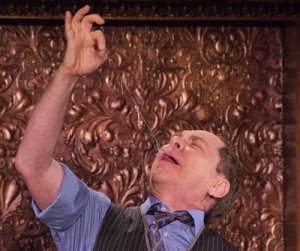 After Mrs. T and I returned home, I looked up “A Couple of Eccentric Guys,” the New Yorker profile by Calvin Trillin that first brought Penn & Teller to my attention back in 1989. I hadn’t read it for years, and was startled to find that Teller had talked to Trillin about the aspect of Penn & Teller on Broadway that had fascinated me most:
After Mrs. T and I returned home, I looked up “A Couple of Eccentric Guys,” the New Yorker profile by Calvin Trillin that first brought Penn & Teller to my attention back in 1989. I hadn’t read it for years, and was startled to find that Teller had talked to Trillin about the aspect of Penn & Teller on Broadway that had fascinated me most:
I think that when people leave the theater at the end [of the show] they leave with the sense of having seen a sort of poetic event….I would like for people to have the experience I would like to have. Which is that for a period of time I would like to have my attention compelled by something that moves me from one place to another, from one feeling to another, from one understanding to another—and hints at mysteries that somehow fit together.
Not bad for a guy who never says a word on stage.
(First of four parts)
* * *
Teller does the needle-and-thread trick:
The original theatrical trailer for David Lean’s 1945 film version of Blithe Spirit:



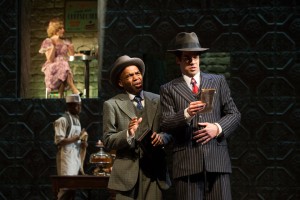 All this was on my mind as I flew out to the Oregon Shakespeare Festival to see Mary Zimmerman’s pared-down “Guys and Dolls.” The OSF has emerged of late as a font of fresh thinking about musical comedy, and Ms. Zimmerman, who hit big on Broadway in 2002 with “Metamorphoses,” her riotously creative visualization of Ovid’s ancient tales of love, struck me—in theory, at least—as the ideal director to put her own spin on a musical that’s been around long enough to profit from a makeover. On the other hand, her 2010 Goodman Theatre staging of “Candide” was hectic and over-stuffed, which made me wonder what she’d do with a show that is, unlike the famously flawed “Candide,” so close to perfect that it resists retouching.
All this was on my mind as I flew out to the Oregon Shakespeare Festival to see Mary Zimmerman’s pared-down “Guys and Dolls.” The OSF has emerged of late as a font of fresh thinking about musical comedy, and Ms. Zimmerman, who hit big on Broadway in 2002 with “Metamorphoses,” her riotously creative visualization of Ovid’s ancient tales of love, struck me—in theory, at least—as the ideal director to put her own spin on a musical that’s been around long enough to profit from a makeover. On the other hand, her 2010 Goodman Theatre staging of “Candide” was hectic and over-stuffed, which made me wonder what she’d do with a show that is, unlike the famously flawed “Candide,” so close to perfect that it resists retouching. Ten years ago, “The Light in the Piazza” and “The 25th Annual Putnam County Spelling Bee” opened on Broadway in close succession, and all at once it looked as though there was hope for the future of the musical. No such luck: Not until “Hamilton” did another new musical of comparable excellence ring the box-office bell on Broadway, though “Piazza” and “Putnam County” were promptly taken up by regional theaters and continue to be revived there to fine effect. So when the Bucks County Playhouse announced that it would be putting on “Putnam County” this summer, I decided to see what that promising company would do with a show whose New York production, superlatively well-directed by James Lapine, remains bright in my memory. Fear not: Jessica Stone’s staging is very nearly as strong as the breathtaking “Company” that Hunter Foster directed for Bucks County earlier this year.
Ten years ago, “The Light in the Piazza” and “The 25th Annual Putnam County Spelling Bee” opened on Broadway in close succession, and all at once it looked as though there was hope for the future of the musical. No such luck: Not until “Hamilton” did another new musical of comparable excellence ring the box-office bell on Broadway, though “Piazza” and “Putnam County” were promptly taken up by regional theaters and continue to be revived there to fine effect. So when the Bucks County Playhouse announced that it would be putting on “Putnam County” this summer, I decided to see what that promising company would do with a show whose New York production, superlatively well-directed by James Lapine, remains bright in my memory. Fear not: Jessica Stone’s staging is very nearly as strong as the breathtaking “Company” that Hunter Foster directed for Bucks County earlier this year.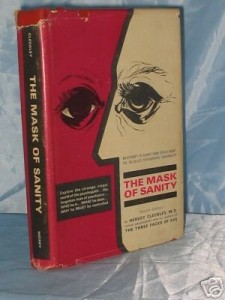 In today’s Wall Street Journal “Sightings” column I talk about a new government program designed to support works of serious scholarship that are aimed at a popular audience—and show how such scholarship, when done well, can change a culture. Here’s an example.
In today’s Wall Street Journal “Sightings” column I talk about a new government program designed to support works of serious scholarship that are aimed at a popular audience—and show how such scholarship, when done well, can change a culture. Here’s an example.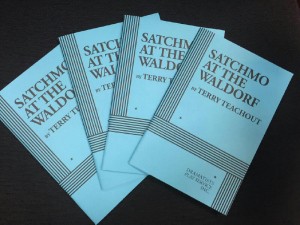 Four years ago next month, Satchmo at the Waldorf, my first play, was premiered in Orlando, Florida. Since then it’s been produced in Lenox, Los Angeles, New Haven, Philadelphia, and off Broadway, and it’ll be staged later this season in Chicago, Colorado Springs, San Francisco, and West Palm Beach. Now I’ve received word that a package containing the very first printed copies of Dramatists Play Service’s
Four years ago next month, Satchmo at the Waldorf, my first play, was premiered in Orlando, Florida. Since then it’s been produced in Lenox, Los Angeles, New Haven, Philadelphia, and off Broadway, and it’ll be staged later this season in Chicago, Colorado Springs, San Francisco, and West Palm Beach. Now I’ve received word that a package containing the very first printed copies of Dramatists Play Service’s